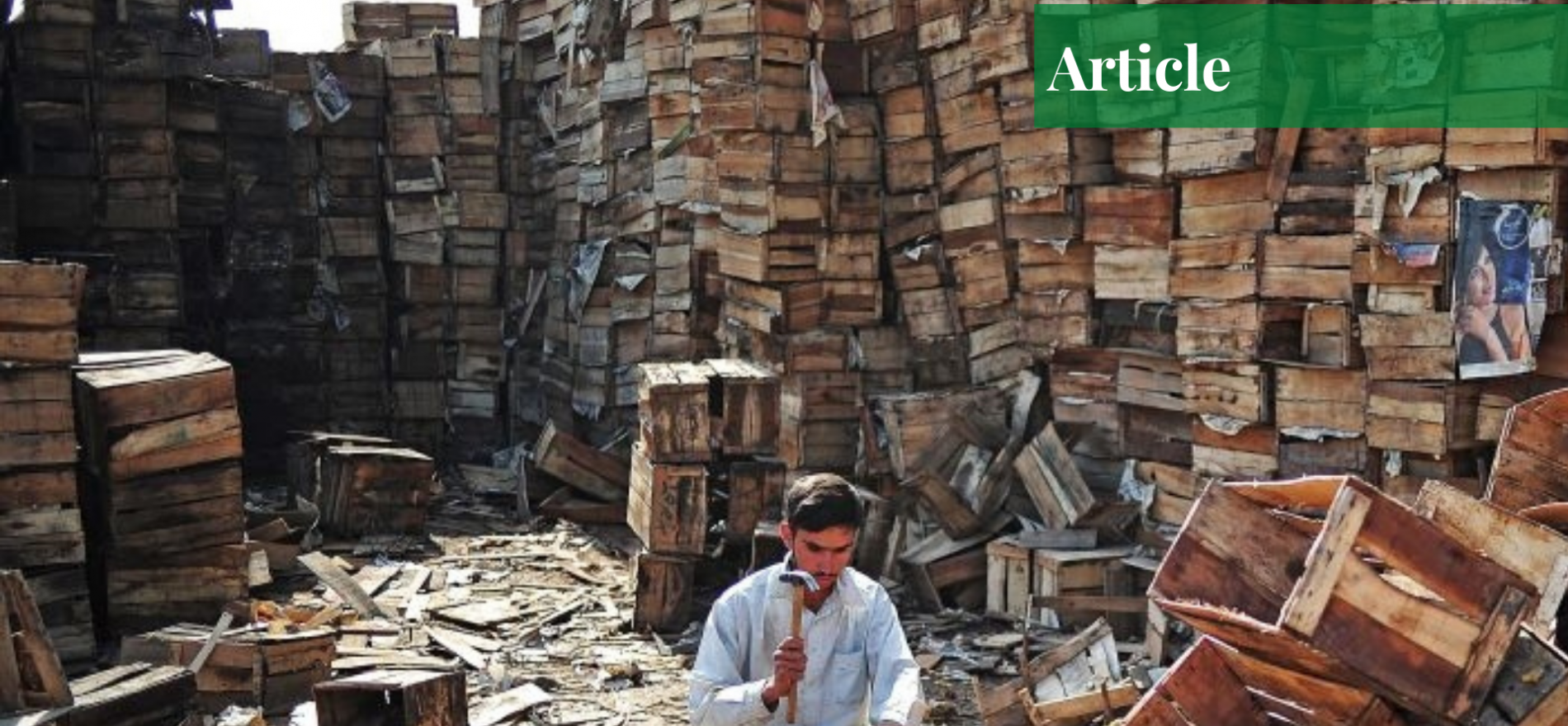Muzamil is a freelance writer with an expertise in global politics and international relations. He currently also works as a writer/contributor for Paradigm Shift. Apart from that, he loves to read and is socially active in philanthropic activities.
The Other Side of the Economy
The majority of Pakistan, which has taken a big hit due to the COVID-19 pandemic and its adverse economic ripples, is largely subsided under the garb of Naya Pakistan and its unachievable contours. PM Imran Khan of Pakistan has oftentimes driven its policy-making bodies toward the informal economy which largely remains unregistered.
Statistically, this informal sector has been a major source of livelihoods for the same majority that is kept unaccounted for throughout Pakistan’s history whenever a path towards the development of human resources is devised. To reinvigorate the already bearish economy, multiple economic packages were announced to facilitate the daily wagers who are the major chunk representing the informal economy.
However, that was all in vain because the hurdle seems to be larger than what it is conceived to be. The informal sector of Pakistan is blooming and the numbers are not favorable for the state apparatus to comprehend, mainly because they are not registered with the government and its institutions. Hence, the revenue generated for the government remains underestimated.
The Growth of the Informal Economy
Over the last two decades, the informal sector in Pakistan has considerably grown in spite of the country’s strenuous following of IMF programs, which has most likely forced more people into the informal sector. According to the World Bank, the informal sector, which accounts for more than 60% of the total workforce and 71.3% of the non-agricultural labor, is estimated to be more than 1/3rd of the country’s GDP.
The Small and Medium Enterprise Development Authority (SMEDA) reported that more than 40% of Pakistan’s GDP comes from the informal sector. In Asia, it is estimated that 65 percent of the working population is employed informally. However, according to previous estimates from Pakistan’s Labor Force Survey, 71.7 percent of the total working rural population was employed in informal employment, compared to 69.9 percent in urban areas.
Similarly, Asian Development Bank (ADB) confirms this notion statistically that more than 90% of the businesses having 50 employees or less are operating in the informal sector. The variety of these reports confirm that the informal sector’s contribution to GDP has increased significantly (nearly doubled) in the last two decades or so.
Informal-Formal Sector Compatibility
The numbers further indicate that the informal sector has either grown or that the formal sector has shrunk. Whichever case that might be, it clearly tells that the informal sector should never be left unchecked. Some studies suggest that the informal sector has complemented the formal sector majorly in two ways.
First, it supplied cheap inputs in bulk to the capitalist firms at subsidized rates. Secondly, it offered low-cost goods and services to the working class, thereby reducing demand for higher wages. The procedure of informalisation can be done in multiple ways: businesses in the formal sector employ the staff on a seasonal or contractual basis and then lay them off; firms in the formal sector give a contract to the ones operating in the informal sector who further subcontract home-based staff.
Moreover, the formal sector enterprises directly hire the home-based staff themselves. In short, the formal sector takes the help of multitudes of labor working in the informal sector without assurance of any perks and benefits that are accessible to the staff working in the formal sector.
Unregistered Businesses
The majority of small businesses lack the capital and expertise necessary to scale up to the ‘‘medium-sized” stage. As a result, small businesses make up the majority of the informal economy. Wholesale and retail, community and personal services, manufacturing, and transportation are among the primary sectors of employment in Pakistan’s informal economy, according to International Labor Organization (ILO).
In cities, small towns, and certain parts of metropolitan areas, there isn’t a single grocery store that is registered. The cottage industry and handicrafts are two more industries that are masked in mystery. These unregistered companies are squandering state money and jeopardizing the state’s ability to accumulate tax revenue. As a result, registering the country’s informal economy remains a huge policy issue.
Regarding policy making, there’s a grave issue at hand: most of the businesses working in the informal economy are not even considered part of the informal economy. They have been blatantly neglected e.g., street vendors. Since 2010, at least ten large-scale operations have been conducted in different parts of Lahore to clear street-vending “encroachments.”
The capture of vendor pushcarts and the removal of any temporary structures erected by these vendors were carried out by town municipal administration officers. Yet, they are not covered in the Punjab Labor Policy of 2018. This policy document covered home-based contracting, construction, and agriculture, but there is no particular attention given to street vendors who constitute the majority of those working in the informal sector.
The Dark Side of the Informal Sector
It is true that players in the grey economy – another name for the informal economy – can easily hide their wealth, especially in Pakistan. Self-employed persons account for almost 64 percent of all informal workers, and they can deceive the authorities by underestimating their financial benefits.
Many accused of having a lower level of tax morality are more concerned with public sector corruption, high tax rates, lengthy processes, distributive discrimination, and what they call the authorities’ unfairness. To secure a failsafe collection of taxes, a systematic and proactive registration is direly needed of every enterprise, whether small, medium, or large.
Another big obstacle for small businesses in the informal sector is a lack of capital. Bank credit, which would enable these businesses to expand into larger units, is not available in any significant way. Microfinance is not cheap either. According to some researchers, the average life span of small and micro businesses in the informal sector is shorter than that of their formal counterparts.
Corruption
Apart from these fiscal and monetary disturbances, the two monsters that thrive in the shadow of an unregistered economy are black money and corruption. It is an established narrative that most of the enterprises that lie in the informal sector are owned by politicians who have made their black money white through investing in small businessmen who can easily be intimidated and backed for any business dealings that might be considered unconstitutional.
Related to black money, the exchange of goods worth billions of rupees through the eastern and western borders remains unaccounted for due to the vested interests of some influential mafia operating within the government departments. There are multitudes of traders who are engaged in such activity backed by powerful people assuming significant positions within the power corridors of Islamabad.
Whenever there’s a push from international financial institutions to streamline this underground economy, these border trades are stopped temporarily and resumed after a short hiatus but the problem remains that the potential benefits that can be retrieved by the government from this trade are taken out of the equation ingeniously.
In Pakistan, the informal economy has far-reaching socioeconomic consequences. If not addressed properly, it will continue to facilitate tax avoidance, the depletion of national wealth, the inaccuracy of gross national income calculations, budgetary allocation pitfalls, and the difficulties of formulating appropriate fiscal policies and growth strategies.
Recommendations
The first step towards formalizing the informal sector is to acknowledge that it exists, and the second step lies in establishing trust with vendors by ensuring them of the numerous benefits of becoming part of the formal sector. Coupled with that, the government should proactively frame some easy solutions for tax filing. A lot of businesses find it hectic to keep scrolling through documents and files needed for their business to register with the national exchequer.
For this purpose, the Securities and Exchange Commission of Pakistan (SECP) should chalk out a roadmap that is based on pragmatic solutions for these informal businesses. As long as the taxation procedure remains simple, it will induce voluntary compliance, provided that there is an efficient tax intelligence system in play, which if remains inexistent or operating with numerous deficiencies would not help in the proper collection of taxes.
Favorable outcomes can also be achieved by revising labor market laws and instilling a sense of social responsibility in people’s minds. The media can play a pivotal role in detecting unregistered economy operators, public consumption by individuals and groups, and exposing major tax evaders.
To cement the foundations of policy revision, it would be prudent to collect precise data. As a result, job development on a large scale and opportunities to start micro-businesses will bear fruit. A big leap can be generated in this field by following the success stories of countries such as Switzerland that have taken pragmatic steps to pull the informal sector towards the formal economy.
Pakistan should follow the lead of developed countries and take the necessary steps to establish a comprehensive national revenue strategy. The ultimate solution remains the registration of the unregistered.
If you want to submit your articles and/or research papers, please check the Submissions page.
The views and opinions expressed in this article/paper are the author’s own and do not necessarily reflect the editorial position of Paradigm Shift.



















